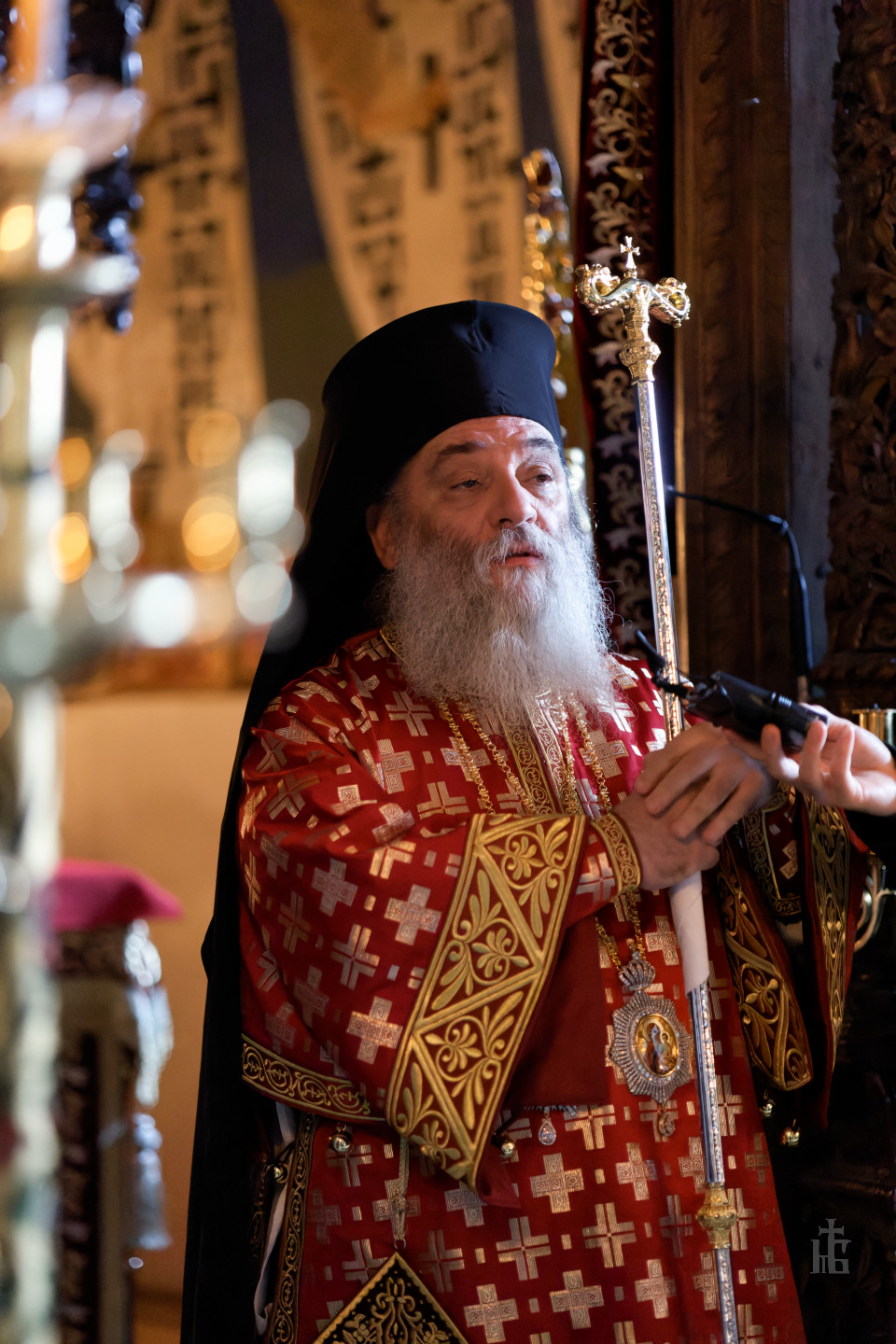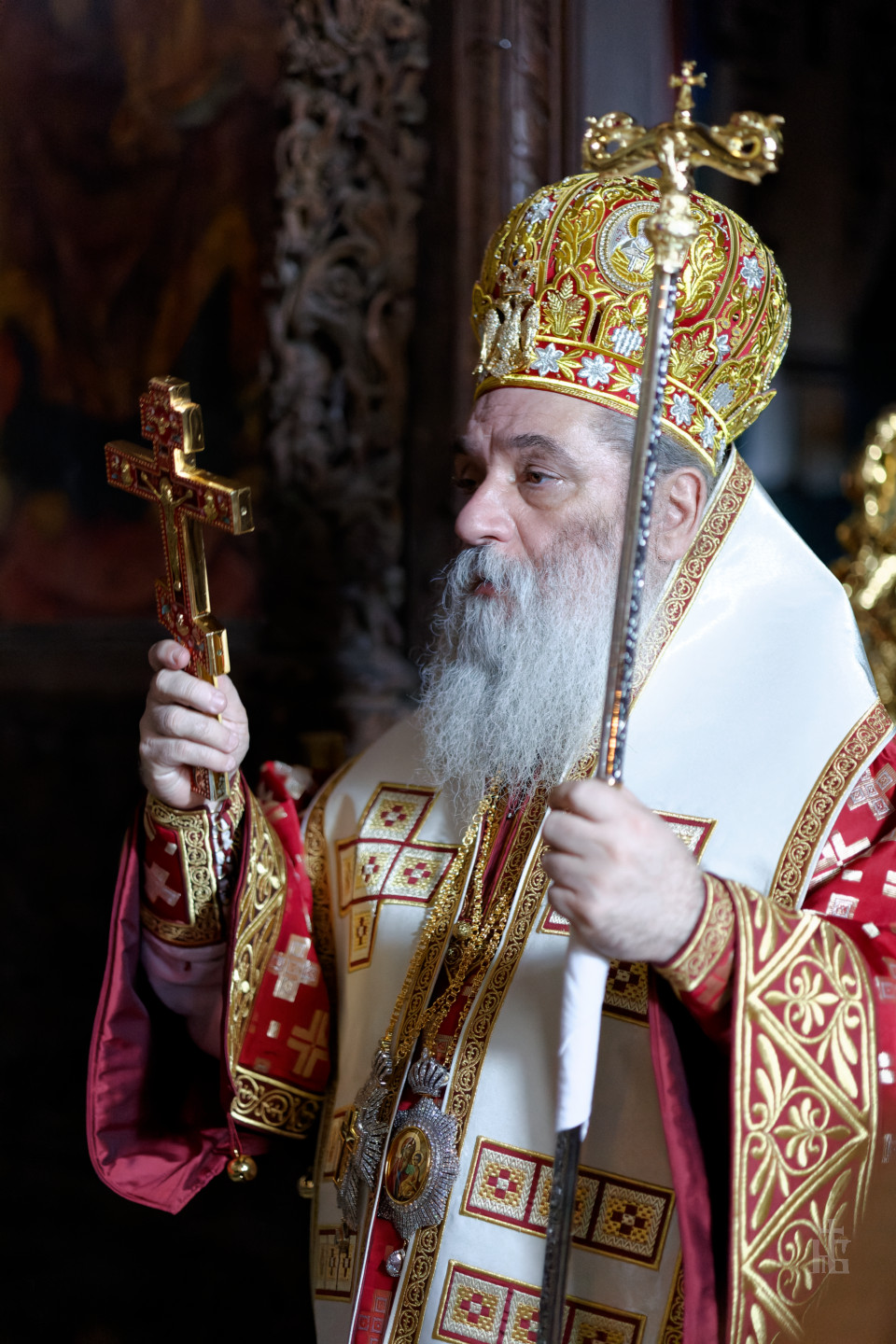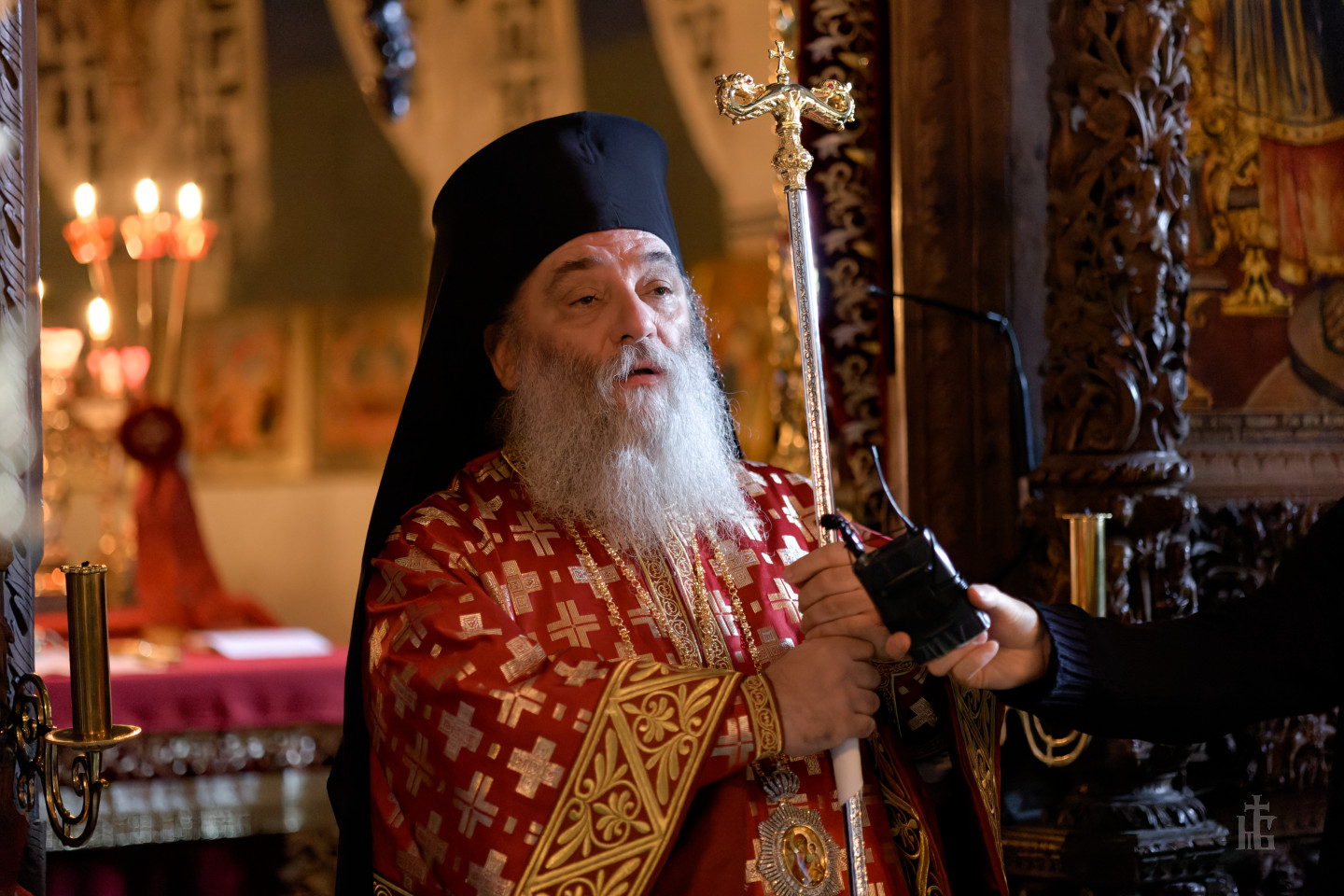A Homily by His Grace Bishop Partenij of Antani, delivered during the Divine Liturgy on Forgiveness Sunday, March 4/17, in the year of Our Lord 2024
In the name of the Father, and of the Son, and of the Holy Ghost!
Standing at the threshold of the Holy and Great Lent, spiritually enlightened and wise from the three preparatory weeks that have passed, today, on this fourth Sunday, we are called to contemplate the monastic essence of our ascetic journey. In the divine wisdom of today’s Gospel reading, spoken from the mouth of our Savior Lord Jesus Christ, the correct pursuit of true riches is revealed. People often are deceived by the material wealth of this world, believing it to be the source of their security. Many strive with all their might to accumulate it, believing that therein lies the guarantee for a good and secure life. However, Christ points us towards a completely different path, reminding us that only spiritual wealth is imperishable.

The fast that the Church now proposes to us is not merely abstaining from certain types of food, but rather, it is a spiritual movement towards the imperishable treasury of the Kingdom, towards the greatest feast of our faith – the Resurrection of Christ, which is, in fact, the ultimate destination of our earthly journey. God clearly shows us that we are created for life in bliss and love. Therefore, a foretaste of that Heavenly Kingdom is already among us, at every Divine Liturgy and through festive celebration in gratitude, humility, and spiritual joy, especially through the celebration of Christ’s Resurrection.
Throughout this movement towards the main goal, we are called to commune with God’s love, as well as with love among us. Therefore, it is of essential importance for us to learn to forgive one another and of course, to strive with good and blessed effort. Fasting is precisely that, an effort and an arena for practicing virtues: forgiveness, mercy, patience, humility, moderation, and love. The Holy Apostles, following Christ during His earthly life, tasted the greatest wealth that can exist – communion with Him. But, when the time of tribulations and temptations came, when Christ prophesied about the Cross and His suffering, one of His disciples, tempted by the then prevailing Jewish expectation of a Messiah with an earthly kingdom and power, succumbed to the temptation to betray Him.

The Holy Church, in anticipation of the Holy Forty Days, not only calls us but also encourages us towards intensified asceticism. The path to the Resurrection, as a path to union with God, is not easy. On the contrary, it is a path of sacrifice, abstinence, and struggle. Throughout the “Forty-day Spring,” we will face cold winds and storms, which demand our unwavering resolution and courage. We must not forget the lesson from the Gospel about the disciple who, captivated by the earthly, betrayed the Priceless One for thirty pieces of silver. Nor were the other Apostles commendable, who, when faced with their human weaknesses that we all share, at the moment they were put to the ultimate test – the choice between life and death, they fled, leaving their Teacher. Even Peter, the most fervent and, one might say, the bravest among them, denied Christ three times before the rooster crowed, just as it was foretold to him. However, the Apostles were not blinded by the earthly and attached to the material like Judas, but they maintained their faith and hope that they would not be forsaken by the Savior. United and in prayer, they awaited comfort from above and ultimately witnessed and communed with Christ’s Resurrection. Their example teaches us humility and the recognition of our human frailties and insufficiencies.
My beloved, the purpose of the upcoming fast is to feel and witness the Resurrection of Christ, to unite and commune with our sweet Christ. Therefore, it is essential that we prepare ourselves and arm ourselves with Christian virtues: temperance, prayer, mercy, and love. These virtues must be the cornerstone of our journey through the fast. Without them, it would be merely a regular diet, lacking any deep spiritual value. In our modern life, the cult of the human body is evident, and lacking anything else to boast of, modern man increasingly expresses himself through physical nudity and attributes, rather than through the virtues of the soul. This obsession with physical appearance and the many diets followed as fashion trends should in no way be equated with the holy fast, nor should it distract us from the true essence of blessed temperance, which is actually the transformation and ennoblement of the soul and heart. Yes, it is true that fasting is healthy for the body, but its primary value is that it is given to us as a means for spiritual and soul healing, recommended by Our Savior Himself. Therefore, let us use this blessed time as a God-given opportunity for spiritual nourishment of our souls, so that they may bloom with the fruits of the Spirit and grow in knowledge and love towards Him. Let us accept with open heart and soul the commandment of fasting that Lord Christ bestows upon us. With our attitude, let us follow the example of the ancient Ninevites, who under the leadership of their king, heeded God’s voice spoken through the prophet Jonah; they heeded the call to repentance and turned away from their wicked ways, saving the entire people from inevitable doom. The preaching of the prophet Jonah and the miraculous change in the hearts of the Ninevites remain deeply rooted in our Christian tradition, as a luminous reminder of the power of sincere repentance and fasting. That change, that need for spiritual transformation and conversion, is just as relevant and necessary today. At one of the services last week, a sticheron called us precisely to that – to accept fasting as the Ninevites did: “Let us joyfully accept, faithful, the God-inspired command of fasting, as once did the Ninevites… With temperance let us prepare for the Mystical Supper on Zion; with our tears let us cleanse ourselves now, before He (like the apostles) washes us.” And time relentlessly approaches, the hour of meeting with Christ inevitably will come. Therefore, it is important to show ourselves prepared for that act, because at the end of this life, our final meeting will be with the Lord. Just as the end of this fast will be a grace-filled meeting with the risen Christ, Who will fully reveal Himself to us.
In Christ’s act of humility, when He washed His disciples’ feet, we are shown the example of Divine love and humility, which we too should follow. The Lord emptied Himself of His divinity, became man, spread His arms on the Cross at Golgotha, to embrace us all, to wash and cleanse us. He did everything for us and our salvation. Let us not allow, now, our hearts to become hardened by material riches, so that we become like Judas, obsessed with earthly things. Thus, we will miss the Lord and fail to reach the goal for which we were created.
Therefore, beloved, let us cling our hearts to Christ, leaving behind earthly attractions. The material riches that the Lord gives us in this world are but small and insignificant gifts that should not distract us from the true wealth – that which is eternal and imperishable. We can use the wisdom and understanding given to us by God to acquire material wealth, but the same should serve us to help the poor, to build and assist God’s temples, to support the Church’s mission, and to do numerous good deeds, by which our soul draws closer to the Heavenly Kingdom. The history of the Holy Scripture shows us that many wealthy people became disciples of Christ, like Saint Joseph of Arimathea, who, with great love for Christ, offered his own tomb – at that time, a very expensive burial place, carved in stone, intended for the burial of the wealthy, showing selflessness and sacrifice. Christ tells us: For where your treasure is, there will your heart be also (Matthew 6:21). If our heart is only attached to earthly goods, then our future will be tied to them. We cannot serve Mammon and the true God; wealth, when not managed within the bounds of God’s grace and mercy, can easily become our idol. Therefore, Christ compares it to God. Let us, therefore, be wise and careful, and use our earthly goods as a means for spiritual growth, not as an obstacle and temptation that will alienate us from God.

Before us is a holy and blessed time. Tomorrow begins Clean Week, so named for the cleansing of souls through prayer and fasting, which leads us to Theodore Saturday and to the triumphant feast on the Sunday of Orthodoxy. With great enthusiasm and spiritual joy, I wish you a fruitful and God-pleasing fast. Much can be done by those who repent and pray with tears. I do not say righteous, for we all are laden with sins, but penitents. Penitents, whose hearts and souls are overwhelmed with the desire for God’s grace. The world in which we live, now more than ever, is in need of God’s mercy and enlightenment. It is our task to pray for this, to seek from God, this world increasingly sinking into sin and evil, to be overshadowed with His light. Therefore, my dear ones, we Christians must be prepared and catch the moments when the world will want to emerge from that abyss – for you well know that one does not live in that darkness. The human soul, ensnared by sin, is constantly tormented, desperately wanting to escape from that state. When that longing becomes unstoppable, all of us in the Church, first and foremost the hierarchs, priests, monks, but also you, Christians, must be prepared to embrace that world which will show a desire for repentance and will wish to come back to Christ. But let us ask ourselves: Are we truly prepared to embrace the suffering person and give Christ to the world, as the answer to all its problems? Unfortunately, we must admit that we Christians sometimes get drawn into the worldly spirit of discord and condemnation. How many believers have lost their evangelical ethos, becoming quarrelsome and judgmental. But we should live in love, in mercy, in fasting, and in prayer. That is our true path. Every fast should be a spiritual asceticism, growth in spirituality, in striving and effort to draw closer to God – that is the essence of our Christian life, and therefore that asceticism should not end with the fast but should continue thereafter, all the way to our ultimate outcome. My heart now is filled with love for all of you and with a desire for your spiritual advancement. I ask forgiveness from all of you if I have saddened anyone and bless you with all my heart. May your fast be blessed and God-pleasing!
A good Great Lent!















